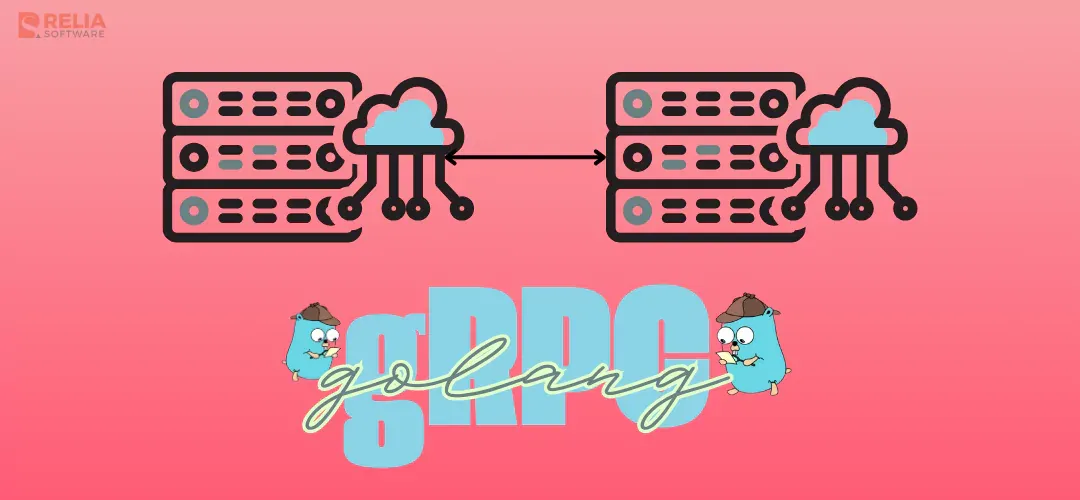In today's microservices-driven world, efficient communication between services is crucial. gRPC (Google Remote Procedure Call) has emerged as a powerful solution, offering high performance, strong typing, and excellent language support. This guide will dive deep into gRPC implementation using Go, helping you understand why it might be the perfect choice for your next project.
>> Read more: gRPC vs GraphQL: Choosing the Right API Technology
What is gRPC?
gRPC is a modern, open-source Remote Procedure Call (RPC) framework initially developed by Google. It uses HTTP/2 for transport and Protocol Buffers (protobuf) as its interface definition language. This combination provides several advantages:
- Efficient binary serialization
- Built-in streaming support
- Strong typing across languages
- Bidirectional communication
- Language-agnostic service definitions
Why Choose gRPC with Go?
Go's excellent concurrency support and performance characteristics make it an ideal language for implementing gRPC services. The combination offers:
- Native Code Generation: Automatic generation of server and client code
- Type Safety: Compile-time type checking prevents runtime errors
- Excellent Performance: Binary protocol and multiplexing capabilities
- Built-in Middleware Support: Easy integration of interceptors
- First-class Streaming: Support for all streaming patterns
Getting Started
Let's build a simple user service to demonstrate gRPC in action. Our service will handle basic user management operations.
Setting Up Your Environment
First, install the required tools:
# Install the protocol compiler
$ brew install protobuf# For macOS# For other systems, download from: https://github.com/protocolbuffers/protobuf/releases# Install Go plugins for protocol compiler
$ go install google.golang.org/protobuf/cmd/protoc-gen-go@latest
$ go install google.golang.org/grpc/cmd/protoc-gen-go-grpc@latestDefine the Service
Create a user.proto file:
syntax = "proto3";
package user;
option go_package = "userservice/proto";
service UserService {
rpc CreateUser (CreateUserRequest) returns (User) {}
rpc GetUser (GetUserRequest) returns (User) {}
rpc ListUsers (ListUsersRequest) returns (stream User) {}
}
message User {
string id = 1;
string name = 2;
string email = 3;
int32 age = 4;
}
message CreateUserRequest {
string name = 1;
string email = 2;
int32 age = 3;
}
message GetUserRequest {
string id = 1;
}
message ListUsersRequest {}
Generate Go Code
Generate the Go code from your protocol buffer definition:
protoc --go_out=. --go-grpc_out=. user.protoImplement the Server
Here's how to implement the gRPC server:
package main
import (
"context"
"log"
"net"
"sync"
pb "userservice/proto"
"google.golang.org/grpc"
"google.golang.org/grpc/codes"
"google.golang.org/grpc/status"
)
type server struct {
pb.UnimplementedUserServiceServer
mu sync.Mutex
users map[string]*pb.User
}
func newServer() *server {
return &server{
users: make(map[string]*pb.User),
}
}
func (s *server) CreateUser(ctx context.Context, req *pb.CreateUserRequest) (*pb.User, error) {
s.mu.Lock()
defer s.mu.Unlock()
// Generate a simple ID (in production, use proper ID generation)
id := fmt.Sprintf("user-%d", len(s.users)+1)
user := &pb.User{
Id: id,
Name: req.Name,
Email: req.Email,
Age: req.Age,
}
s.users[id] = user
return user, nil
}
func (s *server) GetUser(ctx context.Context, req *pb.GetUserRequest) (*pb.User, error) {
s.mu.Lock()
defer s.mu.Unlock()
if user, ok := s.users[req.Id]; ok {
return user, nil
}
return nil, status.Errorf(codes.NotFound, "user not found: %s", req.Id)
}
func (s *server) ListUsers(req *pb.ListUsersRequest, stream pb.UserService_ListUsersServer) error {
s.mu.Lock()
defer s.mu.Unlock()
for _, user := range s.users {
if err := stream.Send(user); err != nil {
return err
}
}
return nil
}
func main() {
lis, err := net.Listen("tcp", ":50051")
if err != nil {
log.Fatalf("failed to listen: %v", err)
}
s := grpc.NewServer()
pb.RegisterUserServiceServer(s, newServer())
log.Printf("Server listening at %v", lis.Addr())
if err := s.Serve(lis); err != nil {
log.Fatalf("failed to serve: %v", err)
}
}Implement the Client
Here's a sample client implementation:
package main
import (
"context"
"log"
"time"
pb "userservice/proto"
"google.golang.org/grpc"
"google.golang.org/grpc/credentials/insecure"
)
func main() {
conn, err := grpc.Dial("localhost:50051", grpc.WithTransportCredentials(insecure.NewCredentials()))
if err != nil {
log.Fatalf("did not connect: %v", err)
}
defer conn.Close()
client := pb.NewUserServiceClient(conn)
ctx, cancel := context.WithTimeout(context.Background(), time.Second)
defer cancel()
// Create a user
user, err := client.CreateUser(ctx, &pb.CreateUserRequest{
Name: "John Doe",
Email: "john@example.com",
Age: 30,
})
if err != nil {
log.Fatalf("could not create user: %v", err)
}
log.Printf("Created user: %v", user)
// List users
stream, err := client.ListUsers(ctx, &pb.ListUsersRequest{})
if err != nil {
log.Fatalf("could not list users: %v", err)
}
for {
user, err := stream.Recv()
if err != nil {
break
}
log.Printf("User: %v", user)
}
}Best Practices for Successfully Building Golang gRPC
Error Handling
- Status Codes Implementation
Implementation gRPC provides standardized status codes that should be used consistently across your services:
package main
import (
"google.golang.org/grpc/codes"
"google.golang.org/grpc/status"
)
func (s *server) GetUser(ctx context.Context, req *pb.GetUserRequest) (*pb.User, error) {
// Validate input
if req.Id == "" {
return nil, status.Error(codes.InvalidArgument, "user ID cannot be empty")
}
// Check authorization
if err := validateAuth(ctx); err != nil {
return nil, status.Error(codes.Unauthenticated, "invalid authentication credentials")
}
// Handle not found case
user, err := s.repository.FindUser(ctx, req.Id)
if err != nil {
if err == ErrNotFound {
return nil, status.Error(codes.NotFound, "user not found")
}
return nil, status.Error(codes.Internal, "internal error occurred")
}
return user, nil
}- Context Handling
Proper context handling ensures resource cleanup and timeout management:
func (s *server) ProcessLongRunningTask(ctx context.Context, req *pb.Request) (*pb.Response, error) {
// Create a timeout context
ctx, cancel := context.WithTimeout(ctx, 30*time.Second)
defer cancel()
// Create a channel for results
resultChan := make(chan *pb.Response, 1)
errChan := make(chan error, 1)
go func() {
result, err := s.processTask(ctx, req)
if err != nil {
errChan <- err
return
}
resultChan <- result
}()
// Wait for result or context cancellation
select {
case <-ctx.Done():
return nil, status.Error(codes.DeadlineExceeded, "operation timed out")
case err := <-errChan:
return nil, status.Error(codes.Internal, "processing failed: "+err.Error())
case result := <-resultChan:
return result, nil
}
}Performance Optimization
- Connection Pooling
Implement connection pooling to reuse gRPC connections:
type ClientPool struct {
clients chan pb.UserServiceClient
size int
}
func NewClientPool(size int, target string) (*ClientPool, error) {
pool := &ClientPool{
clients: make(chan pb.UserServiceClient, size),
size: size,
}
for i := 0; i < size; i++ {
conn, err := grpc.Dial(target,
grpc.WithTransportCredentials(insecure.NewCredentials()),
grpc.WithDefaultCallOptions(grpc.WaitForReady(true)))
if err != nil {
return nil, fmt.Errorf("failed to create client: %v", err)
}
pool.clients <- pb.NewUserServiceClient(conn)
}
return pool, nil
}
func (p *ClientPool) GetClient() pb.UserServiceClient {
return <-p.clients
}
func (p *ClientPool) PutClient(client pb.UserServiceClient) {
p.clients <- client
}- Message Size Limits
Configure message size limits to prevent memory issues:
func NewServer() *grpc.Server {
return grpc.NewServer(
grpc.MaxRecvMsgSize(4 * 1024 * 1024),// 4MB
grpc.MaxSendMsgSize(4 * 1024 * 1024),// 4MB
grpc.MaxConcurrentStreams(1000),
)
}Security
- TLS Implementation
Set up secure connections with TLS:
func NewSecureServer() (*grpc.Server, error) {
// Load server certificates
cert, err := tls.LoadX509KeyPair("server-cert.pem", "server-key.pem")
if err != nil {
return nil, fmt.Errorf("failed to load cert: %v", err)
}
// Create TLS credentials
creds := credentials.NewTLS(&tls.Config{
Certificates: []tls.Certificate{cert},
ClientAuth: tls.RequireAndVerifyClientCert,
})
// Create server with credentials
server := grpc.NewServer(
grpc.Creds(creds),
)
return server, nil
}
- Authentication Middleware
Implement token-based authentication:
type AuthInterceptor struct {
jwtManager *JWTManager
}
func (i *AuthInterceptor) Unary() grpc.UnaryServerInterceptor {
return func(
ctx context.Context,
req interface{},
info *grpc.UnaryServerInfo,
handler grpc.UnaryHandler,
) (interface{}, error) {
if err := i.authorize(ctx, info.FullMethod); err != nil {
return nil, err
}
return handler(ctx, req)
}
}
func (i *AuthInterceptor) authorize(ctx context.Context, method string) error {
token, err := extractToken(ctx)
if err != nil {
return status.Error(codes.Unauthenticated, "invalid token")
}
claims, err := i.jwtManager.Verify(token)
if err != nil {
return status.Error(codes.Unauthenticated, "invalid token")
}
return i.validatePermissions(claims, method)
}
Monitoring
- Comprehensive Logging
Implement structured logging with context information:
type LoggingInterceptor struct {
logger *zap.Logger
}
func NewLoggingInterceptor() *LoggingInterceptor {
logger, _ := zap.NewProduction()
return &LoggingInterceptor{logger: logger}
}
func (i *LoggingInterceptor) Unary() grpc.UnaryServerInterceptor {
return func(
ctx context.Context,
req interface{},
info *grpc.UnaryServerInfo,
handler grpc.UnaryHandler,
) (interface{}, error) {
start := time.Now()
resp, err := handler(ctx, req)
duration := time.Since(start)
// Extract trace ID from context
traceID := extractTraceID(ctx)
i.logger.Info("gRPC request completed",
zap.String("method", info.FullMethod),
zap.Duration("duration", duration),
zap.String("trace_id", traceID),
zap.Any("error", err),
)
return resp, err
}
}
- Metrics Collection
Implement Prometheus metrics collection:
go
type MetricsInterceptor struct {
requestCounter *prometheus.CounterVec
requestDuration *prometheus.HistogramVec
requestsInFlight *prometheus.GaugeVec
}
func NewMetricsInterceptor() *MetricsInterceptor {
return &MetricsInterceptor{
requestCounter: prometheus.NewCounterVec(
prometheus.CounterOpts{
Name: "grpc_requests_total",
Help: "Total number of gRPC requests handled",
},
[]string{"method", "status"},
),
requestDuration: prometheus.NewHistogramVec(
prometheus.HistogramOpts{
Name: "grpc_request_duration_seconds",
Help: "gRPC request duration in seconds",
Buckets: prometheus.DefBuckets,
},
[]string{"method"},
),
requestsInFlight: prometheus.NewGaugeVec(
prometheus.GaugeOpts{
Name: "grpc_requests_in_flight",
Help: "Current number of gRPC requests in flight",
},
[]string{"method"},
),
}
}
func (i *MetricsInterceptor) Unary() grpc.UnaryServerInterceptor {
return func(
ctx context.Context,
req interface{},
info *grpc.UnaryServerInfo,
handler grpc.UnaryHandler,
) (interface{}, error) {
i.requestsInFlight.WithLabelValues(info.FullMethod).Inc()
defer i.requestsInFlight.WithLabelValues(info.FullMethod).Dec()
start := time.Now()
resp, err := handler(ctx, req)
duration := time.Since(start)
status := "success"
if err != nil {
status = "error"
}
i.requestCounter.WithLabelValues(info.FullMethod, status).Inc()
i.requestDuration.WithLabelValues(info.FullMethod).Observe(duration.Seconds())
return resp, err
}
}
- Health Checking
Implement health checking service:
type healthServer struct {
pb.UnimplementedHealthServer
mu sync.RWMutex
status map[string]pb.HealthCheckResponse_ServingStatus
}
func NewHealthServer() *healthServer {
return &healthServer{
status: make(map[string]pb.HealthCheckResponse_ServingStatus),
}
}
func (s *healthServer) Check(ctx context.Context, req *pb.HealthCheckRequest) (*pb.HealthCheckResponse, error) {
s.mu.RLock()
defer s.mu.RUnlock()
if status, ok := s.status[req.Service]; ok {
return &pb.HealthCheckResponse{
Status: status,
}, nil
}
return nil, status.Error(codes.NotFound, "service not found")
}
func (s *healthServer) Watch(req *pb.HealthCheckRequest, stream pb.Health_WatchServer) error {
lastStatus := pb.HealthCheckResponse_UNKNOWN
for {
s.mu.RLock()
status, ok := s.status[req.Service]
s.mu.RUnlock()
if !ok {
status = pb.HealthCheckResponse_SERVICE_UNKNOWN
}
if status != lastStatus {
if err := stream.Send(&pb.HealthCheckResponse{Status: status}); err != nil {
return err
}
lastStatus = status
}
select {
case <-stream.Context().Done():
return nil
case <-time.After(time.Second):
continue
}
}
}
- Integration Example
Here's how to combine all these interceptors:
func NewServer(opts ...grpc.ServerOption) *grpc.Server {
// Initialize interceptors
logger := NewLoggingInterceptor()
metrics := NewMetricsInterceptor()
auth := NewAuthInterceptor()
// Chain interceptors
chainedInterceptor := grpc.ChainUnaryInterceptor(
logger.Unary(),
metrics.Unary(),
auth.Unary(),
)
// Create server with all options
opts = append(opts, chainedInterceptor)
server := grpc.NewServer(opts...)
// Register health service
healthServer := NewHealthServer()
pb.RegisterHealthServer(server, healthServer)
return server
}
This implementation provides a robust foundation for production-grade gRPC services with comprehensive error handling, performance optimization, security, and monitoring capabilities. Each component can be further customized based on specific requirements.
Advanced Features
Interceptors
Interceptors are powerful middleware that can be used for logging, authentication, and monitoring:
func unaryInterceptor(ctx context.Context, req interface{}, info *grpc.UnaryServerInfo, handler grpc.UnaryHandler) (interface{}, error) {
start := time.Now()
resp, err := handler(ctx, req)
log.Printf("Request - Method:%s Duration:%s Error:%v\n",
info.FullMethod,
time.Since(start),
err)
return resp, err
}
// In your server main():
s := grpc.NewServer(
grpc.UnaryInterceptor(unaryInterceptor),
)Load Balancing
gRPC provides built-in support for load balancing:
conn, err := grpc.Dial(
"service-name",
grpc.WithDefaultServiceConfig(`{"loadBalancingPolicy":"round_robin"}`),
)>> Explore more:
- Deep Dive into Reflection in Golang: Types, Values, and Beyond
- Gin-Gonic Tutorial: API Development in Go Using Gin Framework
Conclusion
gRPC with Go provides a powerful, efficient, and type-safe way to build distributed systems. Its support for streaming, strong typing, and excellent performance makes it an excellent choice for modern micro-services architectures. By following the examples and best practices outlined in this guide, you'll be well-equipped to build robust gRPC services in Go.
Remember to:
- Start with clear service definitions
- Implement proper error handling
- Use interceptors for cross-cutting concerns
- Monitor your services
- Follow security best practices
The combination of Go's simplicity and gRPC's powerful features creates a fantastic platform for building scalable, maintainable services. Happy coding!
>>> Follow and Contact Relia Software for more information!
- development
- golang
- Web application Development

